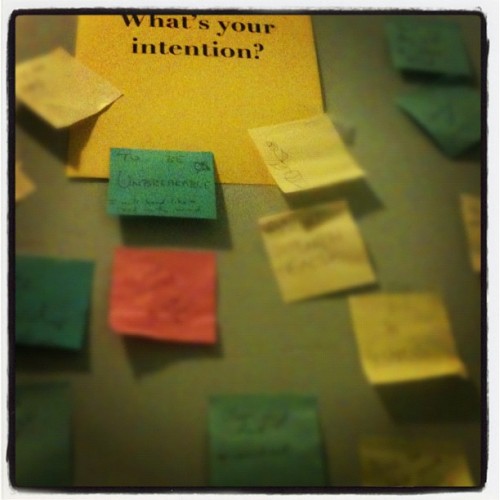How are those new year’s resolutions/intentions working out?
How’s that letting go going?
In case it’s not going so well, here’s a talk I gave on letting go last week at the Madison Shambhala Center.
In some ways, it is the second part to my earlier post on Letting Go. Some of the same themes arise here: how letting go is letting what already happens happen and the natural coming and going of events, people and relationships.
This time around, though, I also address deeper levels of letting go: how we need humor, the difference between setting new year’s resolutions versus new year’s intentions, what to do if you say “I love you” to your partner too much, and what to do if you (like me) are kind of obsessed with ice cream.
Here is an excerpt/adapted text from the talk, to give you a flavor:
In giving this talk at the end of January, I thought I would bring up new year’s resolutions and the counter-culture alternative: setting intentions.
I was surprised to find so many people have turned down resolution-making, because of the self-criticism and pressure they place on themselves. It was a pleasant surprise. Of course it’s a select audience—folks coming to a dharma talk—but the immediate reflections about resolutions and intentions were powerful.
Even still, within this culture of intention that the yoga and meditation world propagate in the West, there can still hide a deep aggression. What’s the intention behind our intentions?
I’d say that key underlying intention must be letting go—real letting go. What that really means is recognizing that everything is truly impermanent and will go on its own if we let it.
Even when we want to let go, there’s aggression behind it. Even though we talk about letting go being a good thing, there’s often an agenda, or concept, behind it: here’s what it looks like, feels like, I will be like this when I let go.
It’s a qualitative or felt sense difference to every day, in practice and a reminder to bring ourselves to something. It doesn’t mean not setting goals. You can even call it a resolution, but still we must see what’s the underlying intention? Is it to change ourselves, get something we don’t have, let go of something we do have? There’s aggression there. Or is our intention/resolution more about curiosity and practice?
What are we letting go of?
Maybe you have an issue with, say, eating all the ice cream in the house when it gets there, or, as the Sakyong mentions in his book, pushing people to get served ice cream at the parlor faster. The fundamental issue is not the ice cream and not even the pushing. It’s the deep level attachment to what we think it will get us/do for us. For example, ice cream will make me happy, solve my problems. Sometimes we believe this, so deeply we don’t see how fleeting it is, we wish it lasted longer and that we’d get it sooner, not just because we want it but because of what else we think it can do for us.
When we are awake enough to begin seeing cause and effect, we can let go of our attachment even to letting go itself.
Enjoy, spread around and comment, question and debate below.
Letting go is an endless topic!
Love elephant and want to go steady?
Sign up for our (curated) daily and weekly newsletters!
Editor: Catherine Monkman
Photo: elephant journal archives

 Share on bsky
Share on bsky





Read 0 comments and reply